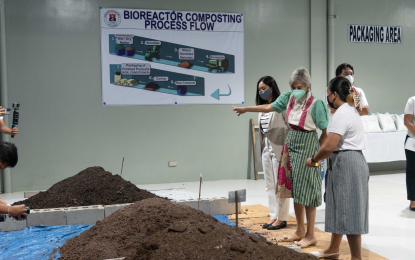
ENVIRONMENT-FRIENDLY. Manila Mayor Honey Lacuna (center) observes the production of soil conditioners at the city's material recovery facility inside the Manila Zoo on Monday (July 18, 2022). Manila is promoting the recycling of biodegradable wastes and other kinds of trash. (Photo courtesy of Manila-PIO)
MANILA – The country’s capital city has partnered with the Department of Environment and Natural Resources - Environmental Management Bureau - National Capital Region (DENR-EMB-NCR) to promote recycling and reduce environmental waste.
Kayle Nicole Amurao, Manila Department of Public Services (DPS) officer in charge, said Tuesday that among Manila’s programs for plastic recycling and management are "Kolek Kilo Kita Para sa Walastik na Maynila", "Alaskalikasan Wrapper Redemption Project", "Aling Tindera: A Waste to Cash Program", and "Tapon to Ipon".
The programs involve exchanging recyclable waste materials, such as single-use plastics and product wrappers for cash, to be turned over to the material recovery facility (MRF) at the Manila Zoo.
They also improve plastic waste management, increase awareness on proper and responsible disposal, gives incentives to female-owned sari-sari (retail) stores, and recycles PET (polyethylene terephthalate or a form of polyester) bottles.
The MRF was launched on Monday.
"Ito pong material recovery facility ay isinasagawa natin para po sa patuloy na pagre-recycle natin at magawa po nating mas kapaki-pakinabang muli ang ilang bagay na sa tingin po natin ay wala nang silbi (This material recovery facility was opened for the city’s continuous recycling projects so we could recycle wastes into something useful)," Mayor Honey Lacuna said during the launch.
The MRF has a bioreactor developed by the Department of Science and Technology (DOST) - Industrial Technology Development Institute, a biocomposter, and two units of biodegradable waste shredder donated by the DENR-EMB-NCR and DOST-NCR.
Amurao said 29,806 kilograms (kg) of biodegradable wastes have been processed by the bioreactor since January 24 and 15,384 kg. in total for the biocomposter since April 11
After the May 9 elections, 26 trucks collected 52.6 tons of tarpaulins through the “Oplan Baklas (Dismantle)” and the "Tarpaulin mo, Ireresiklo ko (Tarpaulins for Recycling)" projects initiated by former mayor Francisco “Isko Moreno” Domagoso.
The tarpaulins were brought to the MRF for sorting; wooden or bamboo frames were processed at the bioreactor/biocomposter and turned into soil conditioner or fertilizer; and the tarpaulins recycled into bags, wallets, and tissue holders, among others, Amurao said.
The MRF is capable of processing biodegradable, recyclable, and residual wastes that could be upcycled into items for livelihood or reuse.
The soil conditioner or fertilizer produced by the MRF is a byproduct of a combination of animal manure from the Manila Zoo, dried leaves collected on the streets, and leftover vegetables from the Divisoria commercial area.
The soil conditioners are used for the city’s greening programs while some are distributed to organizations.
They may also be bought for PHP10 per kg. or by bulk through the DPS Operations Division. (PNA)
